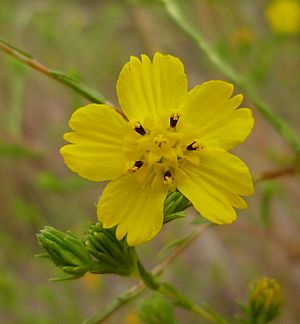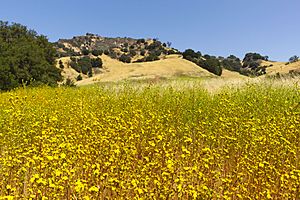Deinandra fasciculata facts for kids
Quick facts for kids Deinandra fasciculata |
|
|---|---|
 |
|
| Scientific classification | |
| Kingdom: | |
| (unranked): | |
| (unranked): | |
| (unranked): | |
| Order: | |
| Family: | |
| Subfamily: |
Asteroideae
|
| Tribe: | |
| Genus: | |
| Species: |
D. fasciculata
|
| Binomial name | |
| Deinandra fasciculata |
|
| Synonyms | |
|
|
Clustered Tarweed (also known as Deinandra fasciculata) is a type of flowering plant. It belongs to the daisy family. You can find it growing naturally in western North America. It's also called Fascicled Spikeweed.
Contents
Where Does Clustered Tarweed Grow?
This plant is native to Baja California and California. It grows mostly from San Diego County up to Monterey County. You can also find it on some of the Channel Islands.
It is very common in coastal grassland areas. It also thrives in other places within the California chaparral and woodlands region. Sometimes, it's seen in city areas near San Francisco Bay. These might be plants that were planted by people.
What Does Clustered Tarweed Look Like?
Clustered Tarweed is an annual herb. This means it grows from a seed, flowers, produces seeds, and dies all in one year. It has thin, branched stems. The plant can grow up to 100 centimeters (about 40 inches) tall.
Leaves and Flowers
The leaves at the top of the plant are narrow. They are about 1 centimeter long and grow close to the stem. They look more like short needles than typical leaves. The lower leaves are much bigger. They can be up to 15 centimeters (6 inches) long.
Each flower head has a center with six yellowish disc florets. These disc florets have black stamens. Five yellow ray florets surround the center. The ray florets usually have three small teeth. The middle tooth is the smallest. These plants bloom from May through October.
The disc flowers in this plant family are special. They are big enough to be seen as tiny flowers without needing a magnifying glass.
Smell of the Plant
This plant has a smell that reminds people of tar.
How Does Clustered Tarweed Live?
Clustered Tarweed relies on bees for pollination. This means bees help the plant make seeds. The seeds mostly spread by falling from the plant when they are ready. This is called gravity dispersal.
Many birds and small mammals also eat the seeds. They can help spread the seeds to new places. This plant can sometimes mix with other plants in its group. It can also mix with Hemizonia and Centromadia species.
 | Leon Lynch |
 | Milton P. Webster |
 | Ferdinand Smith |


